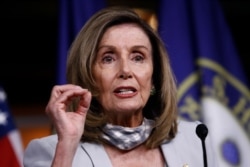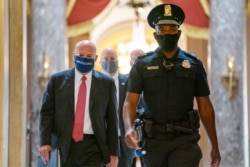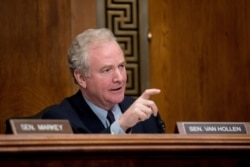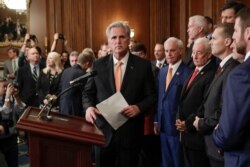With many Americans concerned about casting their ballot in public places during the coronavirus pandemic, mail-in voting is expected to surge dramatically in coming weeks in the runup to the Nov. 3 general election.
Congressional Democrats, however, say recent changes at the United States Postal Service (USPS) could prevent those mail-in ballots from being counted in time and suspect a deliberate attempt to suppress votes. Here’s a look at how the U.S. Congress is reacting to a controversy that has taken center stage in the national political discussion in recent weeks:
Why is the U.S. House of Representatives holding an emergency vote for the postal service?
Democratic House Speaker Nancy Pelosi called a rare emergency session of the chamber for this Saturday, bringing members back from an August break in their home districts.
The House will vote on a bill providing $25 billion in funding, intended to bolster the postal service’s operations and its ability to cope with a huge increase in voting by mail.
The USPS is an independent agency of the U.S. government executive branch that delivers nearly 150 billion pieces of mail annually. In recent years, the postal service has faced revenue losses and a decline in volume, due in part to the rise in online communications.
Why is this an emergency now?
Congressional Democrats are concerned mail-in ballots may not be counted in time due to recent changes at the USPS instituted by Louis DeJoy, the postmaster general who assumed the position in June.
DeJoy – who is a Republican fundraiser and donor to the Trump campaign – instituted measures intended to reduce costs. These included removing mail processing facilities and the blue collection boxes in public places as well as cutting overtime pay for employees and changing operating hours for post offices.
President Donald Trump tweeted support for the move Monday, writing, “The US Post Office (System) has been failing for many decades. We simply want to MAKE THE POST OFFICE GREAT AGAIN, while at the same time saving billions of dollars a year for American taxpayers. Dems don’t have a clue.”
President Trump has often criticized mail-in voting, tweeting the unsupported assertion that increased use of mail-in ballots in November would result in fraud and a “rigged” election. He told Fox Business Network in an interview last week he did not want to make a funding deal with Democrats that would send more money to the USPS to bolster mail handling.
“If we don’t make a deal, that means they don’t get the money,” Trump told Fox Business. “That means they can’t have universal mail-in voting. They just can’t have it.”
The changes at the USPS led to reported delays in processing the mail just when the volume of mail-in ballots is expected to reach unprecedented levels. According to a New York Times analysis, about three-quarters of Americans will be eligible to vote by mail in the presidential election, leading to an estimated 80 million mail-in votes.
Speaker Pelosi said in a statement this week, “During a pandemic, the Postal Service is Election Central. No one should be forced to choose between their health and their vote.”
How have the states responded?
At least 20 states with Democratic attorneys general are suing the USPS over mail delays and protests sprang up around the country in response to the changes.
Congressional Democrats are alleging the changes were an effort on the part of the Trump administration to suppress the votes of many who are likely to vote for the Democrats.
“Anybody knows it is unlawful to interfere with the post office in order to try to cook and fix and disrupt a United States election — which this postmaster general was doing on the orders of Donald Trump, who told the country on national TV and on Twitter that he’s interfering with the post office because he doesn’t like the election,” Democratic Senator Chris Van Hollen said at an event in support of the USPS this week.
How did the postmaster general respond?
DeJoy announced this week that “to avoid even the appearance of any impact on election mail, I am suspending these initiatives until after the election is concluded."
He added, "The Postal Service is ready today to handle whatever volume of election mail it receives this fall.”
In a letter to state election officials last week, the USPS said, “There is significant risk that, at least in certain circumstances, ballots may be requested in a manner that is consistent with your election rules and returned promptly, and yet not be returned in time to be counted.”
Following the DeJoy announcement, House Republicans said that Democrats’ criticism is manufactured for political gain.
“The truth is that the USPS has been on an unsustainable financial path that predates current leadership,” House Minority Leader Kevin McCarthy noted in a letter to Speaker Pelosi Thursday. McCarthy, along with others in the Republican leadership, said Saturday’s emergency vote was unnecessary due to the fact that the “USPS is solvent through at least August 2021, well beyond the November election.”
Is that the end of the controversy?
In reaction to DeJoy’s announcement Tuesday, Pelosi said it was an “insufficient first step in ending the president’s election sabotage campaign. This pause only halts a limited number of the postmaster’s changes, does not reverse damage already done, and alone is not enough to ensure voters will not be disenfranchised by the president this fall.”
The House is still set to vote on the emergency funding Saturday. Additionally, DeJoy will face questions from lawmakers when he testifies before the Republican-led Senate Homeland Security and Governmental Affairs Committee Friday and the Democratic-led House Oversight Committee next Monday.










